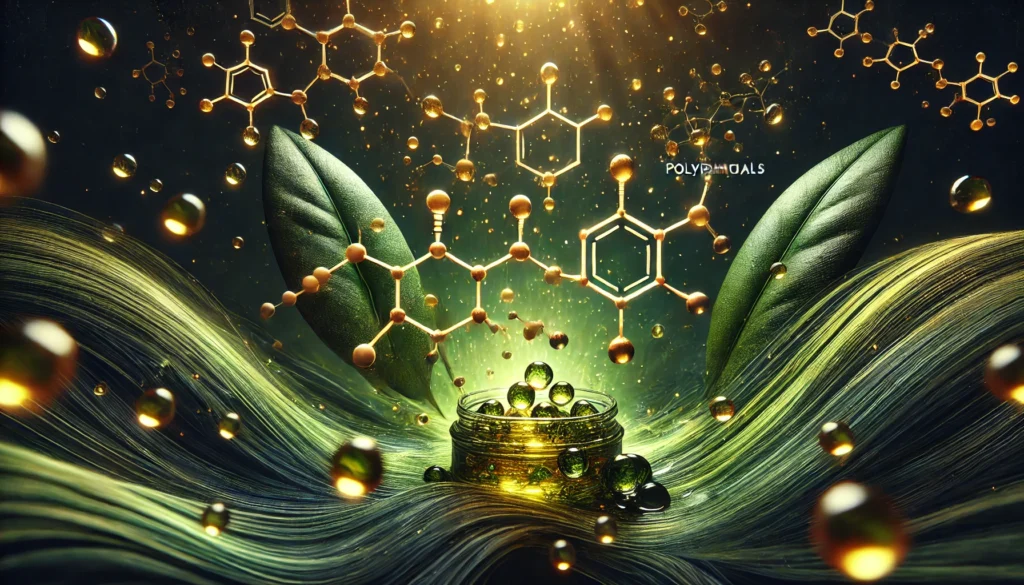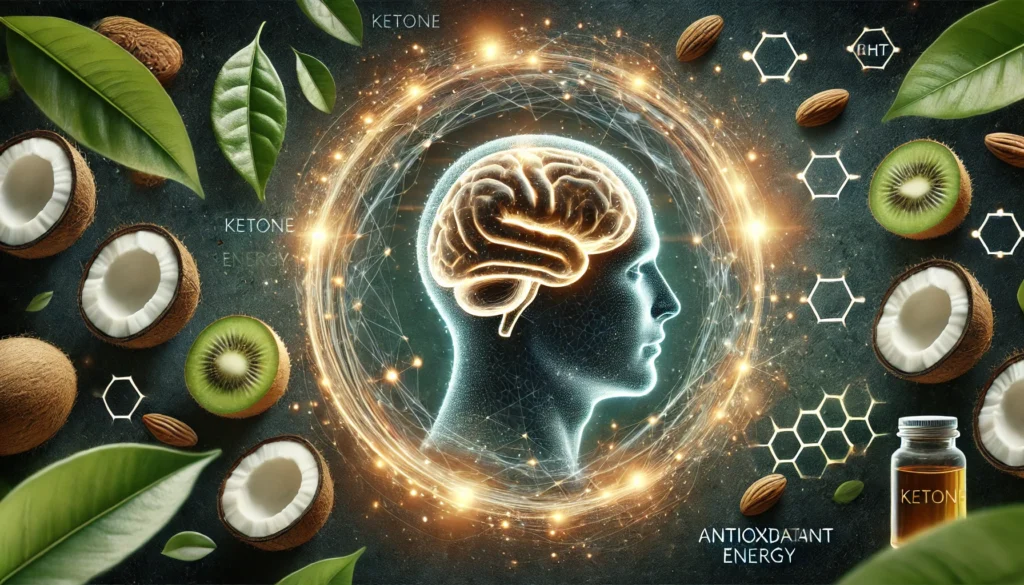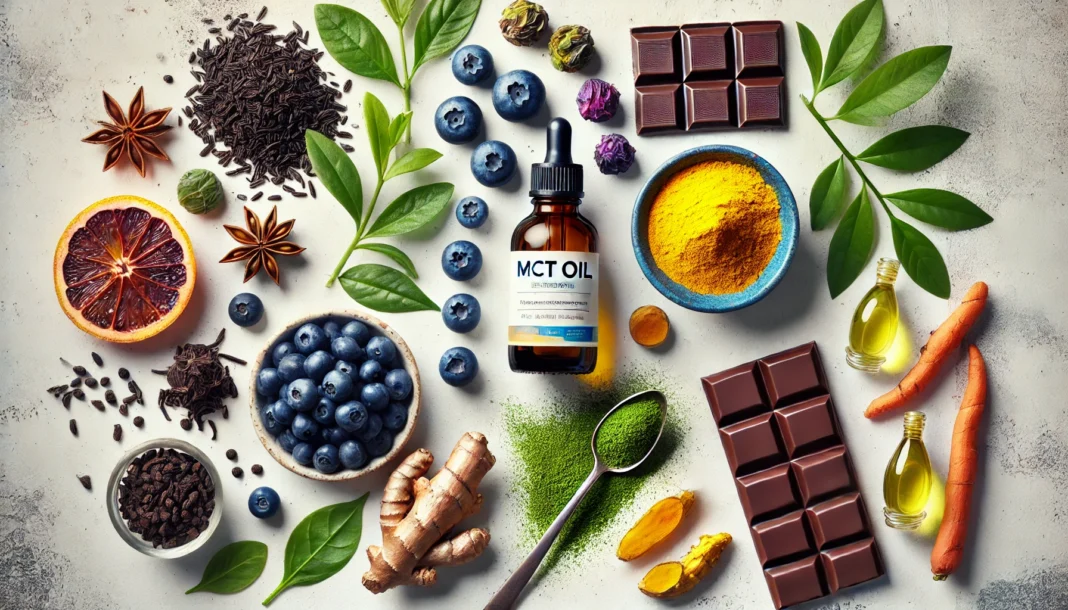Introduction
In recent years, the convergence of nutrition science, functional medicine, and neurobiology has sparked growing interest in unique combinations of nutrients that support cognitive, metabolic, and overall health. Among the most compelling of these pairings is the emerging synergy between MCT polyphenols and medium-chain triglyceride (MCT) oil. As individual substances, both MCT oil and polyphenols have been widely studied for their impressive health benefits—ranging from improved mitochondrial function and enhanced energy metabolism to reduced inflammation and oxidative stress. But when combined, researchers are discovering that polyphenols and MCT oil may offer enhanced, multi-systemic advantages that go beyond their isolated effects.
You may also like: MCT Oil for Dementia and Brain Health: Exploring Its Role in Memory, Function, and Alzheimer’s Support
For the average health-conscious consumer, the daily decision to use MCT oil—especially in the context of a ketogenic or low-carb diet—is often driven by the promise of better brain function, fat metabolism, and sustained energy. Meanwhile, polyphenols—plant-derived compounds with potent antioxidant properties—have long been recognized for their role in promoting cardiovascular health, cognitive resilience, and cellular protection. The fusion of these two bioactive substances into one therapeutic concept—MCT polyphenols—represents a significant development in the science of functional nutrition.
This article will explore the biochemical underpinnings, clinical implications, and practical applications of combining polyphenols and MCT oil. We’ll break down the mechanisms by which they interact, discuss their mutual reinforcement at the cellular level, and examine what this could mean for individuals seeking to improve brain function, metabolic efficiency, and long-term health outcomes. As always, we’ll evaluate the evidence through the lens of scientific rigor, practical use, and the EEAT framework: experience, expertise, authoritativeness, and trustworthiness.
What Are Polyphenols and Why Do They Matter?
Polyphenols are a diverse group of naturally occurring compounds found in plants. They include flavonoids, phenolic acids, stilbenes, and lignans—all known for their robust antioxidant, anti-inflammatory, and anti-aging effects. Common sources of polyphenols include green tea, dark chocolate, red wine, berries, turmeric, and extra virgin olive oil. These compounds are capable of modulating cellular signaling pathways, improving endothelial function, and reducing oxidative damage to DNA and lipids—making them valuable in the prevention and management of chronic diseases such as cardiovascular conditions, cancer, diabetes, and neurodegeneration.
A growing body of research has linked polyphenols to improved cognitive health. This includes their ability to increase cerebral blood flow, protect neurons from oxidative stress, and support neuroplasticity through the activation of pathways like Nrf2 and BDNF (brain-derived neurotrophic factor). In particular, polyphenols such as resveratrol and curcumin have demonstrated neuroprotective benefits that extend into aging populations, offering promise as part of dementia prevention strategies.
But polyphenols are not easily absorbed or bioavailable on their own. Their effectiveness often depends on the presence of certain fats or metabolic cofactors to enhance their stability and transport across biological membranes. This is where MCT oil enters the picture.

MCT Oil: A Brain-Boosting Fat with a Metabolic Edge
Medium-chain triglycerides are a unique class of dietary fats typically derived from coconut oil or palm kernel oil. Unlike long-chain triglycerides, MCTs are rapidly absorbed by the liver and converted into ketones—an alternative fuel source for the brain. This feature makes MCT oil an especially attractive nutritional intervention for individuals on ketogenic diets, people with cognitive decline, or anyone looking to enhance their mental clarity and energy efficiency.
Unlike glucose, which requires insulin for transport and metabolism, ketones produced from MCT oil can cross the blood-brain barrier with ease and provide clean-burning energy to neurons. This is crucial in the context of aging and neurodegeneration, where impaired glucose metabolism—often referred to as “type 3 diabetes”—can starve the brain of its primary fuel source.
Furthermore, MCT oil has been shown to support mitochondrial function, reduce neuroinflammation, and promote the production of neurotransmitters such as GABA and acetylcholine. These properties make it more than just a source of calories—it is a targeted brain support agent.

The Synergy Between Polyphenols and MCT Oil
While both polyphenols and MCT oil independently offer impressive health benefits, combining them may unlock new levels of therapeutic potential. This synergistic relationship is rooted in their complementary mechanisms of action:
MCT oil acts as a highly efficient carrier for fat-soluble polyphenols, increasing their bioavailability and cellular uptake. Certain polyphenols are poorly absorbed in water-based environments and degrade quickly in the digestive tract. The lipid matrix of MCT oil stabilizes these compounds and enhances their transport across intestinal membranes.
Polyphenols, in turn, can amplify the antioxidant and anti-inflammatory effects of MCTs. While MCT oil improves ketone production and mitochondrial output, polyphenols neutralize the reactive oxygen species (ROS) generated during energy metabolism, preventing oxidative damage and preserving neuronal integrity.
Polyphenols may also support gut microbiome health in ways that complement the digestive benefits of MCT oil. Emerging studies indicate that polyphenols act as prebiotics, feeding beneficial bacteria and promoting a healthy gut lining. MCT oil also possesses antimicrobial properties, helping to maintain gut homeostasis by targeting harmful pathogens.
When used together, MCT polyphenols create a holistic biochemical environment that promotes cognitive resilience, gut integrity, and metabolic flexibility. This is why many advanced nootropic and functional food formulations now incorporate both ingredients.
How MCT Polyphenols Affect Brain Health
The brain requires an enormous amount of energy to function—accounting for up to 20% of the body’s total energy use. However, in aging individuals or those with cognitive impairments, the brain’s ability to efficiently metabolize glucose declines significantly. MCT oil, by providing an alternative fuel in the form of ketones, helps bridge this energy gap. When combined with polyphenols, the benefits are amplified through additional antioxidant and anti-inflammatory action.
Polyphenols such as curcumin, quercetin, and EGCG from green tea are particularly well-studied for their ability to reduce beta-amyloid plaque formation, a hallmark of Alzheimer’s disease. When delivered in an MCT oil matrix, these compounds may reach target brain areas more efficiently and exert stronger protective effects.
Furthermore, animal and early human studies suggest that polyphenols and MCT oil may work together to upregulate BDNF, enhance synaptic plasticity, and support neurogenesis—key processes for memory formation and mood regulation. In short, the combination targets both the energy and structural needs of the brain.

The Role of MCT Polyphenols in Inflammation and Oxidative Stress
Inflammation and oxidative stress are foundational contributors to nearly all chronic diseases, including metabolic syndrome, neurodegeneration, cardiovascular dysfunction, and autoimmune conditions. Both polyphenols and MCT oil are known to modulate inflammatory pathways and combat oxidative damage.
MCT oil reduces inflammation by inhibiting NF-kB, a pro-inflammatory transcription factor, while simultaneously increasing ketone levels that serve as anti-inflammatory signaling molecules. Polyphenols amplify this effect by scavenging free radicals, modulating inflammatory enzymes like COX-2, and promoting the expression of antioxidant genes.
Together, MCT polyphenols provide a dual approach—shutting down inflammatory triggers while enhancing the body’s own defense mechanisms. This makes them an ideal combo for individuals managing autoimmune flare-ups, chronic fatigue, arthritis, or even recovery from viral infections.
Enhancing Gut-Brain Axis Communication
The gut-brain axis is a bidirectional communication system that links the gastrointestinal tract with the central nervous system. Disturbances in this connection are now recognized as contributing factors to anxiety, depression, neuroinflammation, and even cognitive decline. Supporting both gut and brain simultaneously is a promising strategy for holistic wellness.
MCT oil supports gut health through its antimicrobial activity and its role in bile flow and fat digestion. Polyphenols serve as prebiotic agents that feed healthy gut bacteria, reduce gut permeability, and modulate immune responses.
Together, polyphenols and MCT oil may restore balance to the gut-brain axis by reducing dysbiosis, calming gut inflammation, and supporting healthy vagal tone. This translates to better mood, sharper cognition, and greater emotional resilience.

Practical Applications and Supplement Forms
Thanks to growing demand and evolving science, MCT polyphenols are now available in a variety of supplement forms—from powders and capsules to functional beverages and emulsified oils. These products often combine MCT oil with specific polyphenols like curcumin, green tea extract, grape seed extract, or resveratrol.
For those seeking targeted cognitive enhancement, look for formulations that combine MCT oil with brain-supportive polyphenols and additional nootropics like phosphatidylserine or alpha-GPC. For metabolic support, choose blends that include fat-burning compounds such as EGCG or berberine.
Timing also matters. Taking MCT polyphenols in the morning can support focus and energy throughout the day. When used pre-workout, they can enhance stamina and fat oxidation. Evening formulations may include calming polyphenols like theaflavins or chamomile extract for relaxation and sleep support.
Dosage, Safety, and Considerations
While both MCT oil and polyphenols are generally considered safe, some individuals may experience side effects—especially at high doses. MCT oil can cause digestive upset such as cramping or diarrhea when taken in excess, while certain polyphenols may interact with medications or affect liver enzymes.
Start with a small dose (e.g., 1 tsp of MCT oil or 250 mg polyphenols) and gradually increase based on tolerance. It is important to select clean, third-party tested products that avoid fillers, artificial additives, or low-quality oils. Pregnant or breastfeeding women and individuals on medications should consult a healthcare provider before beginning supplementation.

Frequently Asked Questions
1. What are MCT polyphenols, and how are they different from regular MCT oil?
MCT polyphenols refer to formulations that combine medium-chain triglycerides (MCTs) with plant-derived polyphenols for enhanced health benefits. While MCT oil provides fast-acting ketone fuel for the brain and body, polyphenols add antioxidant and anti-inflammatory protection. This combination creates a more comprehensive supplement targeting both energy metabolism and cellular defense.
2. How do polyphenols and MCT oil work together to improve brain health?
Polyphenols and MCT oil support brain function by addressing two fundamental needs: energy and protection. MCTs provide ketones that fuel neurons, especially when glucose metabolism is impaired. Polyphenols protect brain cells from oxidative damage and promote neuroplasticity. Together, they enhance focus, memory, and cognitive longevity.
3. Can MCT polyphenols help with inflammation?
Yes, both MCT oil and polyphenols independently reduce inflammation, and their combination amplifies this effect. MCTs suppress inflammatory pathways like NF-kB, while polyphenols block pro-inflammatory enzymes and boost antioxidant defenses. This makes MCT polyphenols a powerful tool for managing chronic inflammation-related conditions.
4. Are there any clinical studies on the combination of polyphenols and MCT oil?
While there are numerous studies on MCT oil and polyphenols individually, research on their combined effects is still emerging. Early data and animal studies suggest synergistic benefits, particularly in brain health and metabolic function. As the demand for functional nutrition grows, more clinical trials on MCT polyphenols are expected.
5. What are the best polyphenols to pair with MCT oil?
Some of the most effective polyphenols to combine with MCT oil include curcumin, resveratrol, EGCG (green tea extract), quercetin, and grape seed extract. These compounds are known for their potent neuroprotective and anti-inflammatory properties and pair well with MCTs for enhanced absorption and effectiveness.
6. Is it better to consume MCT polyphenols in the morning or evening?
It depends on your goals. For energy, focus, and cognitive performance, morning use is ideal. If you’re targeting inflammation or sleep support, evening formulations may be better. The versatility of polyphenols and MCT oil allows them to be customized based on time of day and desired effect.
7. Can MCT polyphenols support weight loss?
Yes, the combination may support fat loss by enhancing ketone production, boosting metabolism, suppressing appetite, and improving insulin sensitivity. Polyphenols also reduce inflammation that can interfere with fat-burning pathways. Together, they offer a holistic approach to body composition management.
8. Do MCT polyphenols improve gut health?
Absolutely. MCT oil has antimicrobial properties that help reduce pathogenic bacteria, while polyphenols act as prebiotics that feed good gut bacteria. The combined action supports a healthier microbiome, reduces bloating, and improves gut-brain communication—benefiting digestion and mental well-being.
9. Are there any side effects of combining MCT oil and polyphenols?
Most people tolerate MCT polyphenols well, but high doses can cause digestive issues or interact with medications. MCTs may cause cramping if taken on an empty stomach, and some polyphenols may affect liver enzymes or blood pressure. Always start with a low dose and consult your doctor if taking medications.
10. How can I choose a high-quality MCT polyphenol supplement?
Look for supplements that use C8 MCT oil, which is the most efficient ketone producer. The polyphenols should come from reputable plant extracts and be free of fillers or synthetic additives. Third-party testing, clear labeling, and reviews from trusted sources are also important indicators of quality.

Conclusion
The emerging science around MCT polyphenols represents an exciting frontier in functional nutrition and integrative health. By combining the metabolic power of MCT oil with the cellular protection of polyphenols, we unlock a synergistic effect that can benefit the brain, gut, immune system, and metabolism. Whether you’re an athlete, a biohacker, someone navigating cognitive challenges, or simply striving for optimal well-being, this combination offers a scientifically grounded, user-friendly intervention.
As with all powerful interventions, quality, timing, and dosage matter. But when used intelligently, polyphenols and MCT oil offer far more than the sum of their parts. They embody a new model of targeted wellness—one rooted in systems biology, nutritional synergy, and evidence-based innovation. By integrating them into your lifestyle, you may not only feel better but also build a stronger foundation for long-term health and cognitive vitality.
Was this article helpful? Don’t let it stop with you. Share it right now with someone who needs to see it—whether it’s a friend, a colleague, or your whole network. And if staying ahead on this topic matters to you, subscribe to this publication for the most up-to-date information. You’ll get the latest insights delivered straight to you—no searching, no missing out.
Further Reading:
MCT Oil vs Coconut Oil: Scientific Breakdown of Benefits, Differences, and Health Uses
MCT Powder vs Oil: Which Is Better for Brain, Energy, and Gut Health?
MCT Powder vs MCT Oil Powder: Benefits, Uses, and Scientific Insights



